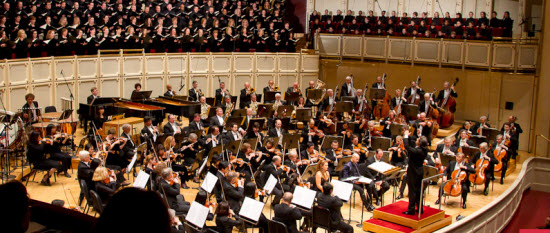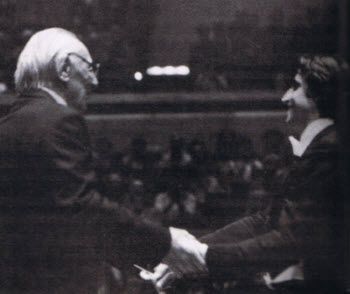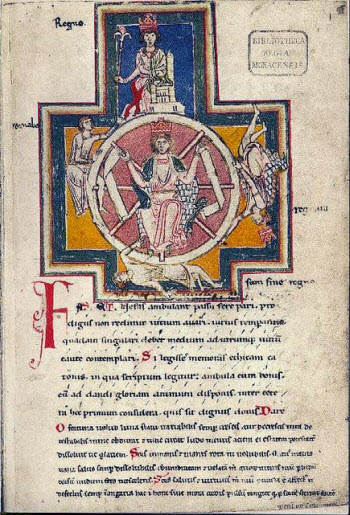In Orff’s earthy ‘Carmina Burana,’ Muti guides CSO and vocal force to Fortune’s throne room
 Review: Chicago Symphony Orchestra and Chorus with the Chicago Children’s Choir conducted by Riccardo Muti. Maria Grazia Schiavo, soprano; Max Emanuel Cencic, countertenor; Stéphane Degout, baritone. Through Jan. 28. *****
Review: Chicago Symphony Orchestra and Chorus with the Chicago Children’s Choir conducted by Riccardo Muti. Maria Grazia Schiavo, soprano; Max Emanuel Cencic, countertenor; Stéphane Degout, baritone. Through Jan. 28. *****
By Lawrence B. Johnson
Earlier this week, the Chicago Symphony Orchestra announced it will open Carnegie Hall’s 2012-13 orchestra series with three performances in early October. On tap for opening night is Orff’s “Carmina Burana,” which music director Riccardo Muti leads this weekend at Orchestra Hall and over which he will preside again at Carnegie.
 After hearing the CSO and its superlative chorus blaze their way through Orff’s lusty cantata on love, libation and the imponderable vagaries of life, I have only this to say to New York’s recipients of this impending gift: At least for one night, you will be Fortune’s favorites.
After hearing the CSO and its superlative chorus blaze their way through Orff’s lusty cantata on love, libation and the imponderable vagaries of life, I have only this to say to New York’s recipients of this impending gift: At least for one night, you will be Fortune’s favorites.
Muti’s long and remarkable association with “Carmina Burana” includes quite an endorsement by the composer himself. In 1980, at age 84, Orff attended a performance Muti conducted with the Berlin Philharmonic. Thoroughly captivated by the freshness he’d just experienced from his oft-performed work, Orff declared Muti’s interpretation “like a second premiere.”
What Muti has recaptured here is as brilliant and arresting a production as you’re likely ever to hear, not only scintillating in every aspect of the orchestral, choral and solo vocal performances but also deeply expressive of the tenderness, misery, resignation and lust that, tumbled together, create Orff’s honest, earthy musical tapestry.
It all starts with Muti. Once again this savvy veteran of the opera house brings his theatrical and poetic sensibilities to bear on “concert” music. Actually, despite our usual encounter with “Carmina Burana” in the concert hall, Orff conceived the 1937 work as a theatrical experience complete with costumes, sets and, indeed, dancers.
But Muti makes a ringing case for the inherent musical sufficiency of this “scenic cantata” (Orff’s term). When his evocative conducting – dynamic, lyrical, rhythmically incisive – is combined with the CSO’s virtuosic playing, the Chicago Symphony Chorus’ precise singing and the profoundly human qualities evinced by the three soloists, what we really have here is a kind of verismo opera. Muti’s vibrant and loving interpretation even put this listener in mind of Mahler’s “Das Lied von der Erde,” composed nearly three decade before.
 Like Mahler in his discovery of a volume of ancient Chinese poems, Orff found his inspiration in a collection of verses on love and life from the Middle Ages in Latin, Middle High German and Middle French. The title “Carmina Burana” simply means “songs of Bavaria.” But the subject matter deals with the eternal merry-go-round of fortune good and ill – of being in and out of health, wealth, love and luck. Thus the works’s famous invocation, “O Fortuna, imperatrix mundi,” which the CSO Chorus delivered as a shattering cry, a desperate shout to an Empress who’s surely not listening.
Like Mahler in his discovery of a volume of ancient Chinese poems, Orff found his inspiration in a collection of verses on love and life from the Middle Ages in Latin, Middle High German and Middle French. The title “Carmina Burana” simply means “songs of Bavaria.” But the subject matter deals with the eternal merry-go-round of fortune good and ill – of being in and out of health, wealth, love and luck. Thus the works’s famous invocation, “O Fortuna, imperatrix mundi,” which the CSO Chorus delivered as a shattering cry, a desperate shout to an Empress who’s surely not listening.
Yet sheer volume was not the point or chief virtue of the choral performance, which modulated gracefully and knowingly from songs of caressing love through a proper conjugation of drink. Against that backdrop of human commonality, the soloists offered affecting instances of personal longing, peril and despair. Soprano Maria Grazia Schiavo capped her radiant performance with a soaring declaration of the sweetness of love, and countertenor Max Emanuel Cencic scored sublime farce in the voice of a roasted swan turning slow on Fortune’s spit. As Orff’s miserable everyman, baritone Stéphane Degout brought a liquid darkness to songs freighted with cynicism and world-weariness.
No less satisfying were the piping voices of the Chicago Children’s Choir, which Muti brought into carefully balanced perspective with the grander parts of a spectacle that will live long in memory.
The concert opened with the world premiere of Dmitri Smirnov’s exuberant “Space Odyssey” for large orchestra, which Muti and the CSO will offer as a calling card on their tour of Russian (and Italy) April 15-28. The seven-minute work makes especially imaginative use of brass and percussion to create the aura of a journeying ship on its sun-splashed roll and tumble through space. It’s a terrific showcase for the CSO and an evident crowd-pleaser. The composer was present to acknowledge a rocket-fueled ovation.
As foil to Smirnov’s burner, Muti offered an elegant turn through the 18-year-old Schubert’s Symphony No. 3 in D, a lean and disciplined essay that honors Beethoven in the urgent pulse of its opening and closing movements and Haydn in the stately bearing of its minuet. The CSO imbued the work with a fetching combination of grace and tensil strength.
Related links:
- Lyrics to Carmina Burana: Side by side at Classical.net
- Muti has recorded Carmina Burana with the Philharmonia Orchestra: Listen to excerpts at Amazon
- Complete details of CSO tour to Carnegie Hall in October: Read the recent announcement
- Performance location, dates and times: Go to CSO.org
- Read Chicago On the Aisle’s exclusive interview with Muti: Part 1
- Read Chicago On the Aisle’s interview with Muti: Part 2
Tags: Carl Orff, Carmina Burana, Chicago Symphony Orchestra, Goddess Fortuna, Maria Grazia Schiavo, Max Emanuel Cencic, Riccardo Muti, Stephane Degout


No Comment »
2 Pingbacks »
[…] Burana.” Free concert of Carl Orff’s cantata at Millennium Park. This one took the roof off at Orchestra Hall recently and it’s a warm-up for the CSO’s Oct. 3 tour date at […]
[…] Burana.” Free concert of Carl Orff’s cantata at Millennium Park. This one took the roof off at Orchestra Hall recently and it’s a warm-up for the CSO’s Oct. 3 tour date at […]